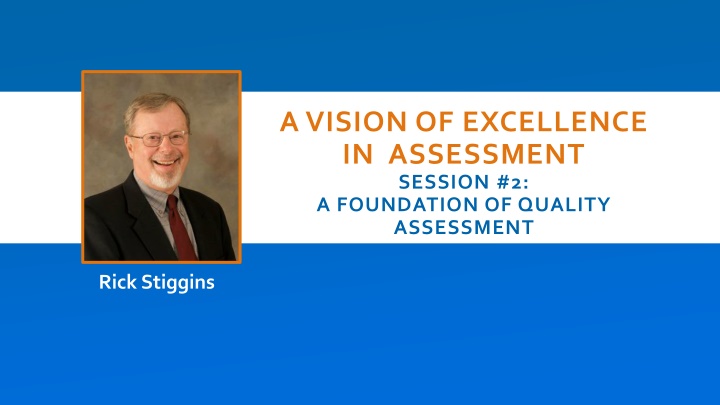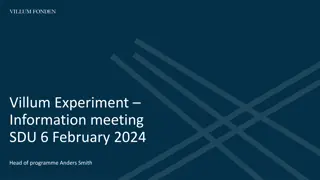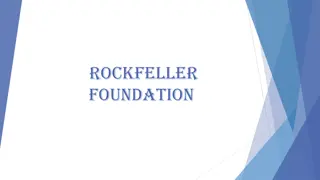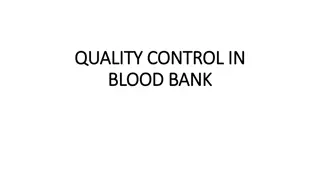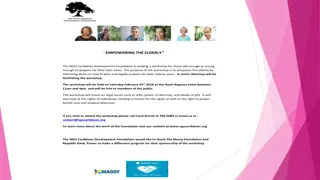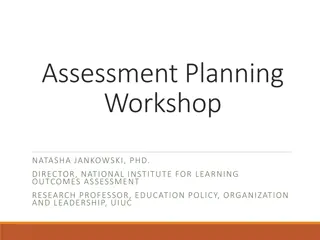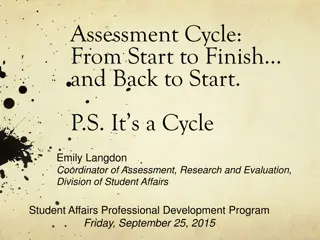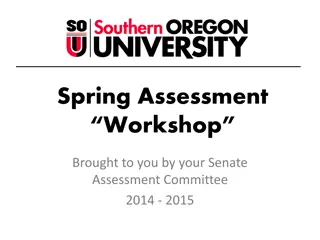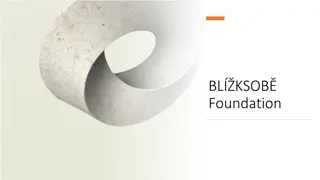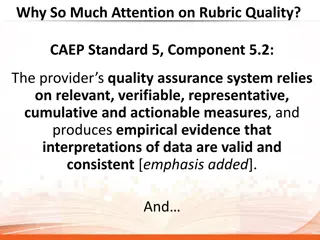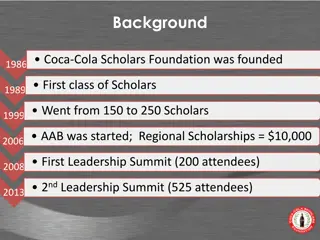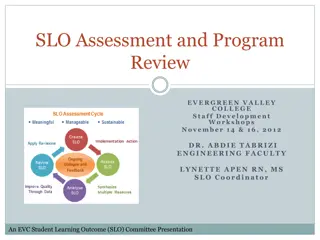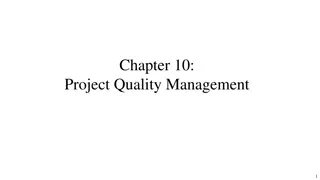Foundation of Quality Assessment Workshop
Delve into the core principles of sound assessment practice with Rick Stiggins in this interactive workshop series. Explore balanced local assessment systems, assessment literacy, emotional dynamics of assessment, and evaluate your assessment system. Gain insights on creating quality assessments, communicating results effectively, and supporting student learning.
Uploaded on Mar 16, 2025 | 0 Views
Download Presentation

Please find below an Image/Link to download the presentation.
The content on the website is provided AS IS for your information and personal use only. It may not be sold, licensed, or shared on other websites without obtaining consent from the author.If you encounter any issues during the download, it is possible that the publisher has removed the file from their server.
You are allowed to download the files provided on this website for personal or commercial use, subject to the condition that they are used lawfully. All files are the property of their respective owners.
The content on the website is provided AS IS for your information and personal use only. It may not be sold, licensed, or shared on other websites without obtaining consent from the author.
E N D
Presentation Transcript
A VISION OF EXCELLENCE IN ASSESSMENT SESSION #2: A FOUNDATION OF QUALITY ASSESSMENT Rick Stiggins
Session 1: Balanced Local Assessment Systems AN INTERACTIVE Session 2: Foundation of Assessment Literacy WORKSHOP IN Session 3: Emotional Dynamics of Assessment FOUR PARTS Session 4: Evaluate Your Assessment System rickstiggins@gmail.com www.MichiganAssessmentConsortium.org 2
All webinar recordings and related handouts can be found at www.michiganassessmentconsor tium.org/events/Stiggins- webinars AN INTERACTIVE WORKSHOP IN FOUR PARTS rickstiggins@gmail.com www.MichiganAssessmentConsortium.org 3
A BALANCED LOCAL ASSESSMENT SYSTEM Users/ Uses Formative Assessment For Learning Summative Classroom Assessment Who? What? Info needed? Interim/ Benchmark Annual Testing rickstiggins@gmail.com www.MichiganAssessmentConsortium.org 4
Unclear about the learning target or how to assess it? Unable to create quality assessments? Unable to communicate results effectively? WHAT IF A DECISION MAKER IN ANY CELL IS: rickstiggins@gmail.com www.MichiganAssessmentConsortium.org 5
ASSESSMENT LITERATE educators understand the basic principles of sound assessment practice. Develop and use assessments that accurately reflect student learning Use the assessment process and its results to either support or verify achievement, depending on the context TWO PARTS OF ASSESSMENT LITERACY rickstiggins@gmail.com www.MichiganAssessmentConsortium.org 6
ACCURACY EFFECTIVE USE PRE-PANDEMIC ASSIGNMENTS: EFFECTIVE COMMUNICATION PURPOSE DESIGN STUDENT INVOLVEMENT TARGET rickstiggins@gmail.com www.MichiganAssessmentConsortium.org 7
ACCURACY EFFECTIVE USE PRE-PANDEMIC ASSIGNMENTS: PURPOSE rickstiggins@gmail.com www.MichiganAssessmentConsortium.org 8
Whos going to use the information? How will they use it; that is, what decision(s) must they make? Therefore, what information will they need? The assessment must provide that information KEY 1: CLEAR ASSESSMENT PURPOSE rickstiggins@gmail.com www.MichiganAssessmentConsortium.org 9
ACCURACY EFFECTIVE USE PRE-PANDEMIC ASSIGNMENTS: PURPOSE TARGET rickstiggins@gmail.com www.MichiganAssessmentConsortium.org 10
Are our targets clear to us? Are they clear to students? Can we identify what kinds of targets we have? Do our assessments reflect the targets students have had the opportunity to learn? KEY 2: CLEAR LEARNING TARGETS rickstiggins@gmail.com www.MichiganAssessmentConsortium.org 11
CLARIFYING LEARNING TARGETS FOR ASSESSMENT Begin with pre-set standards Ordered in learning progressions MASTERED BY TEACHERS WHO ARE TO HELP STUDENTS MASTER THEM Deconstructed into scaffolding leading to each standard Communicated to learners up front in language they can understand The assessment tasks and scoring scheme must reflect the intended target(s) rickstiggins@gmail.com www.MichiganAssessmentConsortium.org 12
ACCURACY EFFECTIVE USE PRE-PANDEMIC ASSIGNMENTS: PURPOSE DESIGN TARGET rickstiggins@gmail.com www.MichiganAssessmentConsortium.org 13
Select a proper assessment method given the learning target Frame an appropriate sample Build quality items, tasks, and scoring schemes Anticipate and avoid bias that can distort results KEY : SOUND ASSESSMENT DESIGN rickstiggins@gmail.com www.MichiganAssessmentConsortium.org 14
AVAILABLE ASSESSMENT METHODS Selected Response Multiple Choice True/False Matching Fill in Performance Assessment Personal Communication Questions Conferences Interviews Extended Written Response rickstiggins@gmail.com www.MichiganAssessmentConsortium.org 15
These assessment methods are not interchangeable they work differentially well with different kinds of learning targets None of the methods is inherently superior to the others Each method brings specific strengths and weaknesses You determine which assessment approach fits the context (target & purpose) RULES OF ENGAGEMENT rickstiggins@gmail.com www.MichiganAssessmentConsortium.org 16
ACCURACY EFFECTIVE USE PRE-PANDEMIC ASSIGNMENTS: EFFECTIVE COMMUNICATION PURPOSE DESIGN TARGET rickstiggins@gmail.com www.MichiganAssessmentConsortium.org 17
Formative Purpose Descriptive feedback, not judgmental It focuses on attributes of the student s work Students track and communicate about their evolving learning Summative Purpose Achievement tracked and recorded by learning target Grades communicate achievement of standards Test scores understood by all users KEY : EFFECTIVE COMMUNICATION rickstiggins@gmail.com www.MichiganAssessmentConsortium.org 18
ACCURACY EFFECTIVE USE PRE-PANDEMIC ASSIGNMENTS: EFFECTIVE COMMUNICATION PURPOSE DESIGN STUDENT INVOLVEMENT TARGET rickstiggins@gmail.com www.MichiganAssessmentConsortium.org 19
Key 1:Are students information needs planned for and met as they are learning? Key 2: Do students have a clear vision of the intended learning target(s) from the start? Key 3: Are students able to self-assess and set goals based on their assessment results? Key 4: Do students receive and offer effective feedback during the learning? Key 5: Do students track, reflect on, and share their learning progress? KEY : STUDENT INVOLVEMENT rickstiggins@gmail.com www.MichiganAssessmentConsortium.org 20
WHO NEEDS TO BE ASSESSMENT LITERATE? Teachers, Principals, and District Instructional leaders: believe in assessment quality and make it operational Superintendents and other school leaders: understand keys to quality and commit to assuring that standards of good practice are being met Policy makers: commit to quality, understand what it means in general terms, and set policies that guide sound assessment practice Parents and communities: understand importance of quality in general terms and demand that quality standards be met Students: understand quality well enough to know when to ask questions of their teachers rickstiggins@gmail.com www.MichiganAssessmentConsortium.org 21
A BALANCED LOCAL ASSESSMENT SYSTEM Users/ Uses Formative Assessment For Learning Summative Classroom Assessment Who? What? Info needed? Interim/ Benchmark Annual Testing rickstiggins@gmail.com www.MichiganAssessmentConsortium.org 22
WHAT IF A DECISION MAKER IN ANY CELL IS: Unclear about the learning target? Unable to assure assessment quality? Unable to communicate results effectively? rickstiggins@gmail.com www.MichiganAssessmentConsortium.org 23
If assessment is a key part of instruction and you are an instructional leader, are you ready to supervise assessment practice in your classrooms? How assessment literate are your faculties? HERE ARE THE ESSENTIAL LEADERSHIP ISSUES rickstiggins@gmail.com www.MichiganAssessmentConsortium.org 24
FOR MORE INFORMATION This webinar series is presented by the Michigan Assessment Consortium in collaboration with Rick Stiggins. Contact Rick Stiggins at rickstiggins@gmail.com with questions or feedback about this webinar series. Visit www.MichiganAssessmentConsortium.org for more information about balanced assessment systems and for opportunities to improve assessment literacy for yourself or in your professional community. rickstiggins@gmail.com www.MichiganAssessmentConsortium.org 25
ABOUT THIS SERIES This work is licensed under a Creative Commons Attribution-NonCommercial 4.0 International License. We invite you to share this series of four interactive webinars, in which Rick Stiggins addresses fundamental concepts needed by all educators who aspire to implementing high quality assessment practice designed to advance student learning. Appropriate for: teachers, principals, instructional coaches, central office administrators, superintendents, and others Webinars in this series include: Session 1: Balanced Local Assessment Systems Session 2: Foundation of Assessment Literacy (this webinar) Session 3: Emotional Dynamics of Assessment Session 4: Evaluate Your Assessment System All webinars and interactive handouts are available at www.michiganassessmentconsortium.org/events/Stiggins-webinars rickstiggins@gmail.com www.MichiganAssessmentConsortium.org 26
